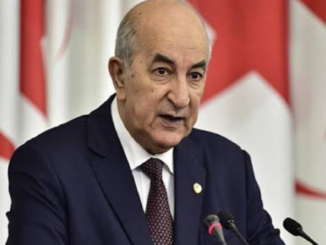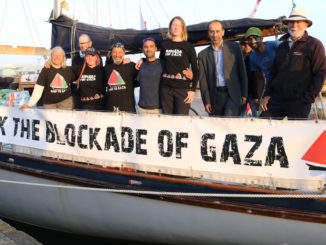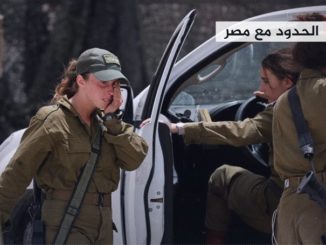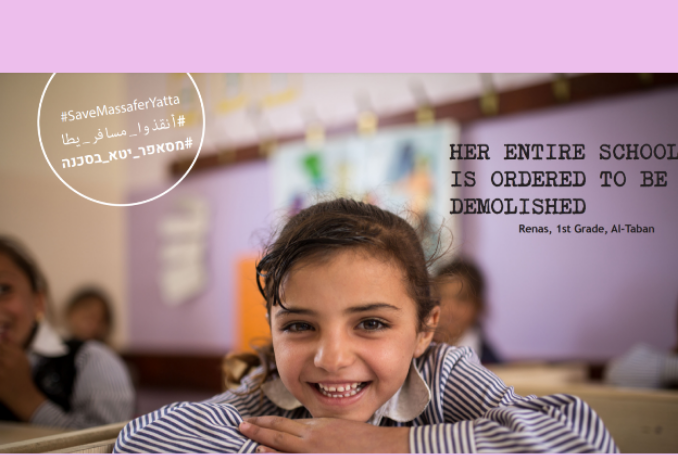
By Hebh Jamal
Photographs hung across Israeli cities showing Palestinians threatened by Israeli expulsion were vandalized only mere hours after activists put them up. Many of the photographs included children with the caption: “Their entire school is ordered to be demolished.”
The photographs capture some of the 1,300 residents of communities in Masafer Yatta, in the southern occupied West Bank, who are facing expulsion and forcible transfer from their homes pending an Israeli Supreme Court ruling in March 2022.
The photos are part of a “Global Week of Action” organized in solidarity with the residents of Masafer Yatta.
Imagine soldiers coming to your neighborhood and renaming it "Firing Zone 918" as a military training facility so they can expel you.
That's what Israel is doing again to 1300 Palestinians in the South Hebron Hills, which is 2% of the entire West Bank. #SaveMasaferYatta pic.twitter.com/fGaM0pYGvn
— raf (@rafaelshimunov) October 30, 2021
“It’s not surprising,” one campaign organizer stated. “Part of the Israeli public isn’t aware of what’s going on – and then there’s just this real desire to look the other way. Like it’s sort of purposeful misinformation,” said the campaign organizer who wanted to remain anonymous.
The Global Week of Action was called upon by the residents of Masafer Yatta who have been fighting displacement in an area the Israeli military has designated a live-fire zone for decades, calling it “Firing Zone 918”.
The long history of evictions in the Masafer Yatta region in the south Hebron Hills began in 1999 when the military expelled over 700 villagers by claiming they were living in the firing zone and were not “permanent residents.”
Organizers are working to expose this lie. They interviewed Zuhour Muhammad Awad who is 73 years old and has lived in the village of Tuba, in the Masafer Yatta region, her whole life. “My mother gave birth to me and I opened my eyes to life in Tuba ” she said. “Today, the world has changed completely. We live in daily terror and under threat of displacement.”
The army is on the hill by Avigail settlement, preventing us from bringing water the village that has no water access. But we will keep coming back #savemasaferyatta pic.twitter.com/72jGh6a82E
— All That's Left: Anti-Occupation Collective (@ATLCol) October 2, 2021
Jaber is 34 years old and was born in Khalet al Daba. “Growing up, we lived a normal life, like that of any human being. Grazing our sheep and cultivating the land kept us busy,” he said.
While residents were able to return in 2000, based on an interim injunction in the Supreme Court that halted displacement, Palestinians living in Masafer Yatta are living in a constant state of fear as they fight to remain in their homes.
Residents are forced to evacuate their homes during military exercises that could last days. Even though they are usually permitted to return, activists say there are dangerous and drastic impacts of having military training in the Masafer Yatta region.
“It is incredibly traumatizing for Palestinian children,” the organizer told The Palestine Chronicle. “They would hear gunfire in the background and the Israeli military would even shut down the roads- the kids literally can’t get to school.”
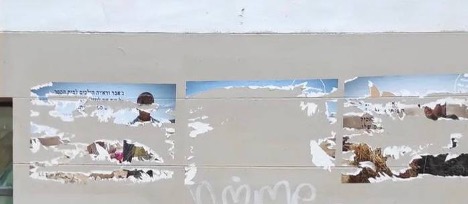
Mohammad Youssef Makhamri is only 18 years old. He lost his hand from a rogue grenade left by Israeli soldiers. “A grenade had exploded on my body, causing fractures in my right leg. Shrapnel from the explosion had settled millimeters from my heart and stomach. And my right hand was entirely blown off.”
The conditions that villagers have experienced are what the UN describes as “coercive environment conditions,” created through “a range of policies and practices that have undermined their physical security and sources of livelihood.”
These policies also include impromptu demolitions. “We are landowners here; we have documents proving it,” said Jaber. “But even if we merely put up a tent, the army comes and gives a demolition order for it.”
Masafer Yatta falls within Area C, which the Israeli occupation administrative body, the Civil Administration, reserves largely for Israeli settlers- resulting in very few building permits granted to Palestinians living there.
Three demolition orders issued by the occupation authorities in Masafer Yatta. #SaveMasaferYatta #SavePalestine #IsraeliCrimes #IsraeliOccupation #IsraeliTerrorism pic.twitter.com/Y7MSHy0uOJ
— Juveria Muhammad (@juveriayildiz) August 17, 2021
“Despite the demolitions, we won’t leave our lands,” Ali Awad, human rights activist and Masafer Yatta resident, told The Palestine Chronicle. “Immediately after the bulldozers leave, all the village residents come to help clean the rubble. We built alternative tents for the family to stay in. Of course, the military targets the tents again, but we just build them again,” he said.
Although the Global Week of Action is attempting to raise as much attention as possible around the ongoing Supreme Court case, they are also hoping to expose the conditions the residents experience on a daily basis.
The residents of Masafer Yatta have seen a drastic increase in settler violence. In September of this year, several Palestinians, including a three-year-old child, were injured during a settler attack. Scores of Jewish settlers, under the protection of Israeli army soldiers, broke into several communities in the Masafer Yatta area. They attacked Palestinian residents and their homes, damaged several vehicles, and uprooted dozens of trees.
According to B’Tselem, eighty-eight percent of the residents have been victims of settler violence, or witnessed such violence toward a first-degree relative. The abuse includes “property damage such as destruction of crops and theft of sheep and goats, intimidation, and physical violence.”
The common method of intimidation is setting dogs at children while they are grazing the sheep and goats or are on their way to or from school.
Awad recalls that students begin their preparations with activists and educators- “not to collect books and begin studying”- but to re-establish contact with the Israeli army to ensure they can get to school safely. Even when he was a child, Awad said he himself needed an escort in order to pursue his education. “I started first grade in 2004, under army escort, and studied this way for 12 years,” he wrote.
“I remember not being able to attend school because my friends and I were waiting for the military escort to arrive. I remember being attacked by settlers even with the presence of the IDF.”
Israeli occupation forces confiscated healthcare facilities and assaulted an old Palestinian man in the area of Masafer Yatta, south of the occupied West Bank, today.#FreePalestine pic.twitter.com/WV2flPb865
— Quds News Network (@QudsNen) July 12, 2021
According to the campaign, if the Israeli Supreme Court votes to expel the Palestinian communities next year, it will be one of the largest forced eviction of Palestinian families in Israeli-controlled territory in decades.
“We need to gather together to stand against the forces of occupation,” said activist Basil Adra.
“We cannot let them evict thousands of people for training or for any reason. The army has barely used this land and when they have been there, they destroy Palestinian land and harass shepherds. They only declared it as a firing zone as an excuse to kick the Palestinians out of their communities. For us, the game they are playing is clear: With no right, they use Palestinian land for these training in order to displace us, but they would never dream of doing this to illegal Israeli outposts or cities,” Adra said.
For more information about the #savemasaferyatta campaign, visit #savemasaferyatta campaign here.
– Hebh Jamal is Palestinian American advocate and journalist currently based in Germany. She contributed this article to The Palestine Chronicle

